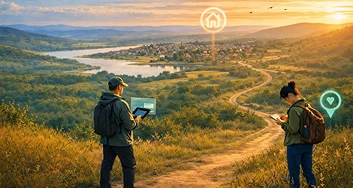On November 2022 we organised the first Digital Leaders Community session - a hand-picked community which aims to bring together the strongest digital leads from across the global destination community, on an invite-only basis.
This panel of global DMOs analysed and discussed the big trends in digital and how big players are preparing the entire digital strategy for the near future. They discussed the future of the digital user journey, sitting on proprietary insights gathered from their sizeable user bases. The panel discussion started by looking at the role and relevance of destination websites.
For Sveinn Birkir Bjornsson (Business Iceland), the importance of maintaining a one-stop shop for information, not just looking for travel information but also safety. They need to be able to direct everyone into a sort of place where they are getting reliable information and everyone can point to one place. In Iceland, this has been a force driver to be able to do everything in one place with very strong and reliable information that is very important to maintain. The DMO needs to take a neutral party in conversations to give relevant information on those topics.
They have also been using Headless CMS for the last 2-3 years. They have intensively discussed whether they should make their content open and available to all through an API.
Katrine Mosfjeld (Visit Norway) explained that their website is very important to them and it will continue to be. It allows them not only to provide information but also to serve as a source of inspiration and allow them to guide segments through the funnel and gather data from their audiences.
To gather data, building a more agile technical landscape will hopefully allow them to improve their understanding of them. This requires having a technological platform and data-gathering methods, more so in light of future legislation. This doesn’t mean that they will stop campaigning, but having always-on content it will allow them to collect data from their audiences, they are building more refined and broad audiences that become more loyal to the brand.
It’s interesting to think of user data in the way that Visit Norway is, as well as platforms and technology. They believe in omnichannel strategies and heavily invest in the website, which is where their main audiences come from.
Visit Finland just rebuilt their website, which is key for inspiration and dreaming purposes, as well as to provide accurate information. Annakaisa explained that we can't rely on our channels exclusively, we need to be omnichannel to reach all customers.
She predicts that in 10 years all destination websites will have different roles, whether Meta or different technologies, providing more hands-on value. Currently, there is a continuous value on data. Despite the thought of metaverse, investment in destination websites is key.
Marketing Greece believes that destination websites not having a relevant role is a very utopic future, as everyone has made huge investments in these platforms.
They are heavily focusing on content creation and SEO strategies because they know they create meaningful content. This shift has shown them that people still want to visit their website and that this is still part of the planning. By providing meaningful content, they want to achieve all of their goals.
The dreaming and planning phases of the visitor journey are heavily influenced by the destination’s website in their view. The booking process - there are people out there who do not necessarily trust the big platforms (Booking, Aviator, etc.), they want direct contact with the tourism industry and feel more secure, and people want local information and knowledge. They see the role of the destination website as fundamental to creating trust and attracting people through authenticity.
VisitDenmark’s team shared that they predict that the importance of DMO websites is decreasing, but the importance of quality content is increasing rapidly.
They need to showcase their very special and attractive offerings, although there is a question on whether this should be on the destination website, as DMO websites play a very small role in the overall digital visitor journey.
The team also shared their struggles with SEO and having a headless CMS, which can cause them to take a big hit in this sense. They have considered developing an app instead of a content hub.
On a different note, Laurie Dempster (Newfoundland and Labrador) explained that the term "website" and the idea of it, especially when you talk with decision-makers, tends to be understood in an old-fashioned way. Essentially, the objective should be to turn destination websites into inspirational sites, rather than marketplaces that connect users with providers. They are meant to become places that store content and gather data, which should also focus on omnichannel strategies, which are key in the changes we are observing.
Investing in storytelling and knowing how to do it in response to the changes in behaviour that we are observing will determine the success of our channels. Destination websites need to be home to all the content that we are creating and its relevance/importance.
Visit Greenland has been thinking of the destination website as a content library for a long time.
They also recognise that they have a big responsibility because oftentimes they are the only source that comes up in Google in English, and they are thinking of becoming the link between themselves and local providers.
After hearing the different perspectives, Marketing Greece explained that, from their experience, having the website in native languages allowed them to reach +20,000/30,000 users from organic searches.
Therefore, they recommended that if the budget allows for it, it is key to translate the website into the target market languages to reach potential audiences. In terms of SEO implications, they are really looking to learn more about this because they'd like to share learnings with their industry because they don't want to jeopardise their SEO investment.
Visit Estonia did some research and found that most of their users first land on Visit Estonia's website, so for them this is a key channel and entry point that they heavily rely on to attract visitors.
Most visitors find information about the destination through their website. They reached these conclusions by looking at traffic, implementing some tools on their website and analysing the different markets.
.webp)




















.webp)
